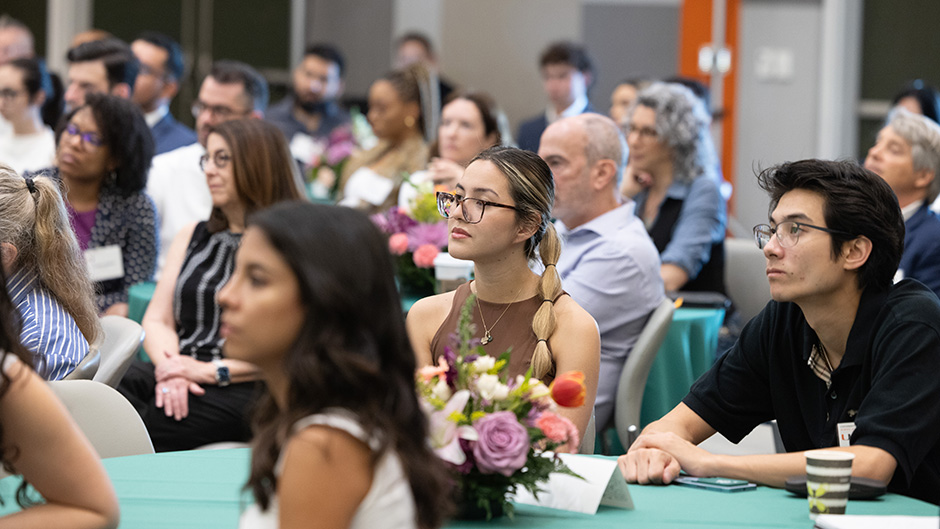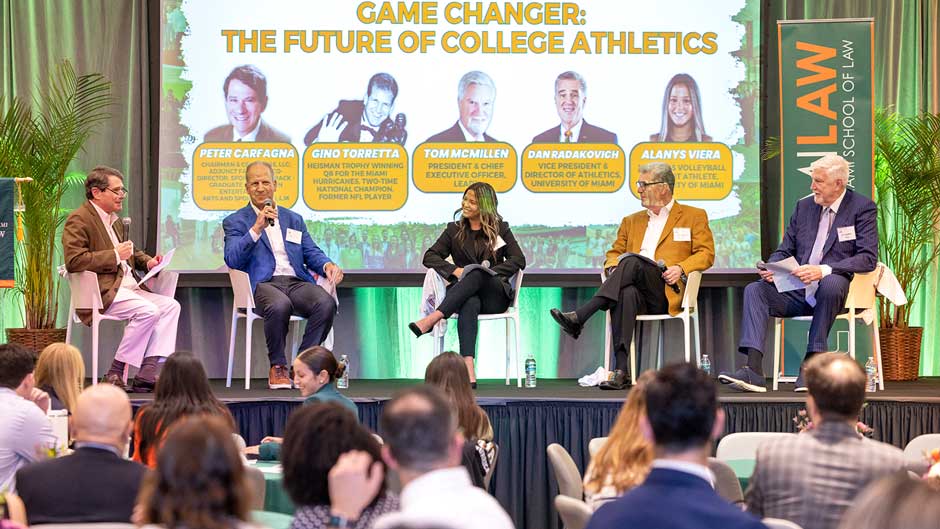This year's 2024 Global Entertainment & Sports Law + Industry Conference kicked off with a lively panel, "Game Changer: The Future of College Athletics," featuring a Heisman Trophy winner, a former Olympian and now president and CEO of the LEAD1 Association—which represents the athletic directors and programs of the Football Bowl Subdivision, the University of Miami athletics director, and a top UM volleyball student-athlete.
Much of the discussion focused on name, image, and likeness (NIL) and its impact on college athletics, with the panelists sharing their insights and perspectives, delving into the complexities and challenges of implementing NIL policies.
"I think the important thing is, first, the game and the competition is the same," said Gino Torretta, the Heisman Trophy-winning former quarterback for the Miami Hurricanes, former NFL player, and College Football Hall of Famer. "Whether it's football, college baseball, college volleyball, the game is the same. It's the elements around the game that have changed. There's a lot more money, so a lot of shuffling on the ancillary. And there is obviously, more exposure."
The panel debated the potential benefits, such as increased opportunities for student-athletes to profit from their personal brand, against concerns about the erosion of amateurism and the potential for inequality among athletes.
"A lot of my players thought that maybe NIL is going to be just for the big sports, like basketball, football, but I think that it gives an opportunity to all sports," said Alanys Viera, the volleyball student-athlete on the panel. "I think if you want to make it happen and you have that drive, then I think anybody in any sports, women or men, can really do NIL if you really put your mind to it. I started reaching out to brands, and I started getting products sent to me and I'd post it and then, eventually, those products turned into a paid post, and then those paid posts turned into bigger companies."
Dan Radakovich, vice president and director of athletics at the University of Miami, said they "provide an awful lot of education for our student-athletes. We give them some opportunities to help enhance their brands. Like what Alana says, she has taken name, image, and likeness in its purest sense and moved it forward. It's really the third pillar of what a student-athlete would have in their college experience. They have their athletic experience, their academic experience, and now they're having their business experience."
The discussion also emphasized the need for clear guidelines and support systems to help athletes navigate the new landscape without compromising their eligibility or educational pursuits.
"I think the whole enforcement thing has been gutted out by the courts right now," said Tom McMillen of LEAD1 Association, who also served in the U.S. House of Representatives. "I've told Charlie Baker, the head of the NCAA, that I don't think personally enforcement is one of the functions the NCAA should be involved in. And I think they should farm that out, sort of like the anti-doping agency in the Olympics. The reason I say that is because it's hard to be the good guy to put championships on and then be the bad guy coming down at schools for enforcement."

Overall, the conversation underscored the transformative nature of NILs on college sports, highlighting the opportunities and hurdles that lie ahead.
Later in the conference, more than 60 top industry leaders from across entertainment, the arts, and sports provided insight on topics including "The Revolution of AI," hot issues in the Latin American music industry, and a women's sports roundtable.
"You're going to hear from heads of players associations, athletic directors, former and current executives, artists, athletes, entertainers, team and lead council, top agents, and other leaders shaping the Miami art scene," Greg Levy, associate dean and director of the Entertainment, Arts, and Sports Law program at the School of Law, told the more than 600 registrants. "We're going to hit on topics from the future of college athletics, the landscape of sports betting, bidding, and hosting for FIFA 2026 World Cup, how art and law shape communities, the Ed Sheeran litigation, from algorithms to artistry, and AI's impact on this industry. And who needs superheroes when we have toys, Barbie and beyond?"
Levy said this year's conference boasts one of the strongest lineups of experts to date. "We have the very top execs at Endeavor, the lawyer who litigated the Ed Sheeran copyright litigation, the general counsel of the New York Yankees and Dallas Cowboys, the chief legal officer of FIFA, the general counsel of Fanatics, the head of diversity and inclusion at LVMH, the executive director of the WNBPA, general counsel at Roc Nation Sports, the general counsel at Mattel, former NBA Player/U.S. Congressman Tom McMillan, and executives from Hard Rock Digital (sports betting)."
Some of the most well-known local and national attorneys, faculty, agents, legal advisers, athletes, and entertainers served as panelists, led Q&A sessions, and fostered academic debate.
The University of Miami School of Law's Entertainment and Sports Law Society and LL.M. in Entertainment, Arts, and Sports Law hosts the annual event. The society delivered its first conference in 1997. Since then, it has grown into a full-scale event where law students and professionals participate in a forum to discuss current legal issues in sports, entertainment, intellectual property, the arts, and the media.

